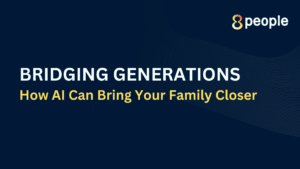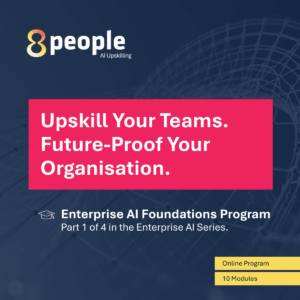In today’s rapidly evolving business landscape, AI Agents are transforming how enterprises operate. But what exactly are they and why should executives care?
Understanding AI Agents
AI Agents are autonomous software entities that go far beyond simple chatbots. They can perceive their environment, make decisions and take actions to achieve specific goals – all with minimal human intervention.
Unlike traditional automation tools, modern AI Agents can:
↗ Understand natural language and maintain context across conversations
↗ Execute complex workflows spanning multiple systems
↗ Learn from interactions to improve over time
↗ Make decisions based on business rules and contextual understanding
↗ Orchestrate processes that previously required human judgment
Types of Enterprise AI Agents
↗ Work Agents – Enhance employee productivity and information access
↗ Process Agents – Automate complex business workflows
↗ Service Agents – Transform customer experience and support
↗ Decision Agents – Provide data-driven insights and recommendations
↗ Orchestration Agents – Coordinate activities across multiple systems
The Executive’s Guide to AI Agent Value
As a senior leader, here’s why AI Agents deserve your attention:
1. Operational Transformation
AI Agents can reduce process cycle times by 40-70% while decreasing operational costs by 25-45%. One global financial services firm automated complex compliance workflows, saving $2.3M annually while improving accuracy.
2. Employee Experience Reinvention
By handling routine tasks and providing instant access to enterprise knowledge, AI Agents free your talent to focus on strategic work. Organisations report 30-45% improvements in employee productivity and satisfaction.
3. Customer Experience Differentiation
AI Agents deliver consistent, personalised service at scale. Leading organisations have seen 40% increases in customer satisfaction and 30% improvements in first-contact resolution.
4. Competitive Advantage
The ability to scale operations without proportional cost increases creates a significant competitive advantage. Early adopters are seeing 15-20% improvements in time-to-market for new initiatives.
Implementation Considerations
Before diving in, consider these critical factors:
↗ Strategic Alignment: Identify use cases that align with your business objectives
↗ Technology Integration: Assess compatibility with existing systems and data sources
↗ Organizational Readiness: Develop a change management strategy to ensure adoption
↗ Governance Framework: Establish ethical guidelines and oversight mechanisms
↗ Measurement Strategy: Define clear success metrics tied to business outcomes
The Path Forward
The question isn’t whether AI Agents will transform your industry, but when and how.
Organisations that develop a strategic approach to AI Agent implementation now will gain significant advantages in operational efficiency, employee productivity and customer experience.
What’s your organisation’s strategy for leveraging AI Agents?
I would love to hear your thoughts.
#AI #AITransformation




